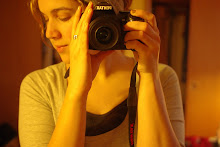I have a lot of cookbooks.
One for soups. One for grilled cheese sandwiches. One for Irish soups and breads, one for homestyle vegetarian, and one for farmer's market finds. One devoted to teas, and one devoted to canning and preserving. Two bread bibles, one blank recipe book for writing down favorites, and one large encyclopedia of herbs. I also got one recently detailing how to stock a creative, earth-friendly, and rustic pantry.
But the newest one is probably the most meaningful of all.
It's called "In Memory's Kitchen", and in it are recipes collected from women who were being held in the Czech concentration camp called Terezin.
Now, I learned about the Holocaust starting in middle school, and I became markedly jaded about the whole thing. After reading a million books--fictional and not--and studying documentaries, and going to plays, and watching movies...you start to get desensitized. Sure, I understood that it was horrific, extraordinarily tragic, and mind-numbingly barbaric, but when you're thirteen years old your brain shuts off to the sadness and just focuses on how boring all the schoolwork is. It was a bad mistake to make, on my part.
Now, holding this book in my hand, I'm overwhelmed with a completely different side of the Holocaust. These Jewish women had been separated from their families and brought to Terezin, most of them to await extermination at Auschwitz. They were crowded together in miserable quarters, made to work, and starved to within an inch of their lives.
But in the huts, and down the work rows, while they were starving, do you know what they talked about?
Food. They exchanged recipes from their days as wives and mothers. Some in detail, some in almost none at all. And a woman named Mina Pachter collected these recipes on scraps of paper, passing them around Terezin until the war ended. Mina Pachter died in Terezin in 1944, but the recipes from the women around her were found, translated, and published in 1996.
I know it seems morbid to cook anything out of a book written by victims of the Holocaust. And maybe it seems odd to use recipes that are often incomplete, translated from a foreign language, and of a culinary tradition I was not born into.
But I've already dog-eared a few pages, and I fully intend to try Mrs. Beran's Tobosch Torte and Mrs. Weil's Farina Souffle, among others. You know why? Because that's the reason I have this book. Food was their touchstone to a world they were forced to leave behind, and food is the connection I have to these women, whom I will never meet. Maybe, in my mind, I'm still a pimply-faced middle schooler who's tired of reading Elie Wiesel and Anne Frank. But now I'm nearly 22, and I still may not be able to wrap my mind around all of the facts, and I still may be numb to all of the horror, but I sure can wrap my heart around what it means to cook, to eat, and to feel a sense of well-being based on food. And that, to me, is where the human side of the Holocaust brings me to my knees.
Yeah, it took me awhile. But I think I'm getting a little piece of my lost humanity back. It's about time.
-The GLS
Subscribe to:
Post Comments (Atom)

No comments:
Post a Comment